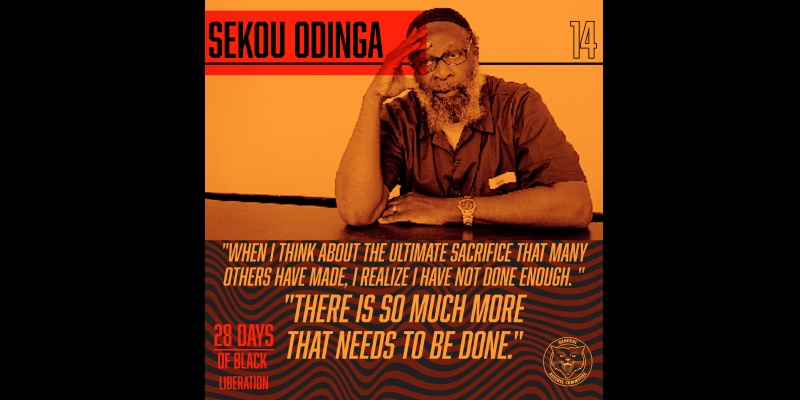Day 14 of the 28 Days of Black Liberation 2024 series
Sekou Odinga was a Black revolutionary and political prisoner, born in 1944 in New York City. “My name is Sekou Odinga. Some of us have never agreed to be American and have struggled to free and build the Republic of New Afrika. Under international law, oppressed people have that right… the right to be free of the oppression and to build a nation that will protect their right to be free and independent.” In his youth, he was drawn to organizing for black liberation after seeing rampant police brutality in his community. Sekou joined Malcolm X’s Organization of Afro-American Unity, was a founding member of the Bronx chapter of the Black Panther Party and eventually joined the Black Liberation Army. Police and FBI repression of the BPP led him to step away from public-facing organizing and join the BLA. He engaged in underground organizing for 12 years and ultimately helped liberate Assata Shakur from prison. He was charged with six fabricated counts of attempted murder of police, and a number of RICO charges related to the release of Shakur. He joined the almost two dozen other BPP members held as political prisoners for more than 30 years.
On what needs to be done: “…when I think about the ultimate sacrifice that many others have made, I realize I have not done enough. There is so much more that needs to be done. As we have fought and struggled, the forces against us have continued to organize and develop strategies to keep us under them. In some ways we are now worse off than we was when I consciously started struggling in the mid ’60s. Unemployment is higher, fewer Blacks are owning their own homes, a lower percentage are going to college. A higher percentage is going to jail. A much higher percentage are killing and maiming each other, especially our youth….”
Odinga was released from prison in 2014. He died on January 12, 2024 at the age of 79 surrounded by family. He is survived by 8 children and 19 grandchildren.
In the United States, the Black liberation struggle is the vanguard of the revolutionary class struggle. Black resistance to white supremacy has been the catalyst for nearly all critical social ruptures throughout american history. White workers choosing an alliance with the bosses instead of siding with the rest of the working class is the primary roadblock to revolutionary anti-capitalism in the US.
The GDC celebrates the Black liberation struggle and draws inspiration and lessons from its proud history in our struggle for the new world we are fighting for. In February we celebrate Black revolutionary culture, political prisoners, international figures and struggles, and moments in direct action that guide us in our continued, collective fight for liberation!

